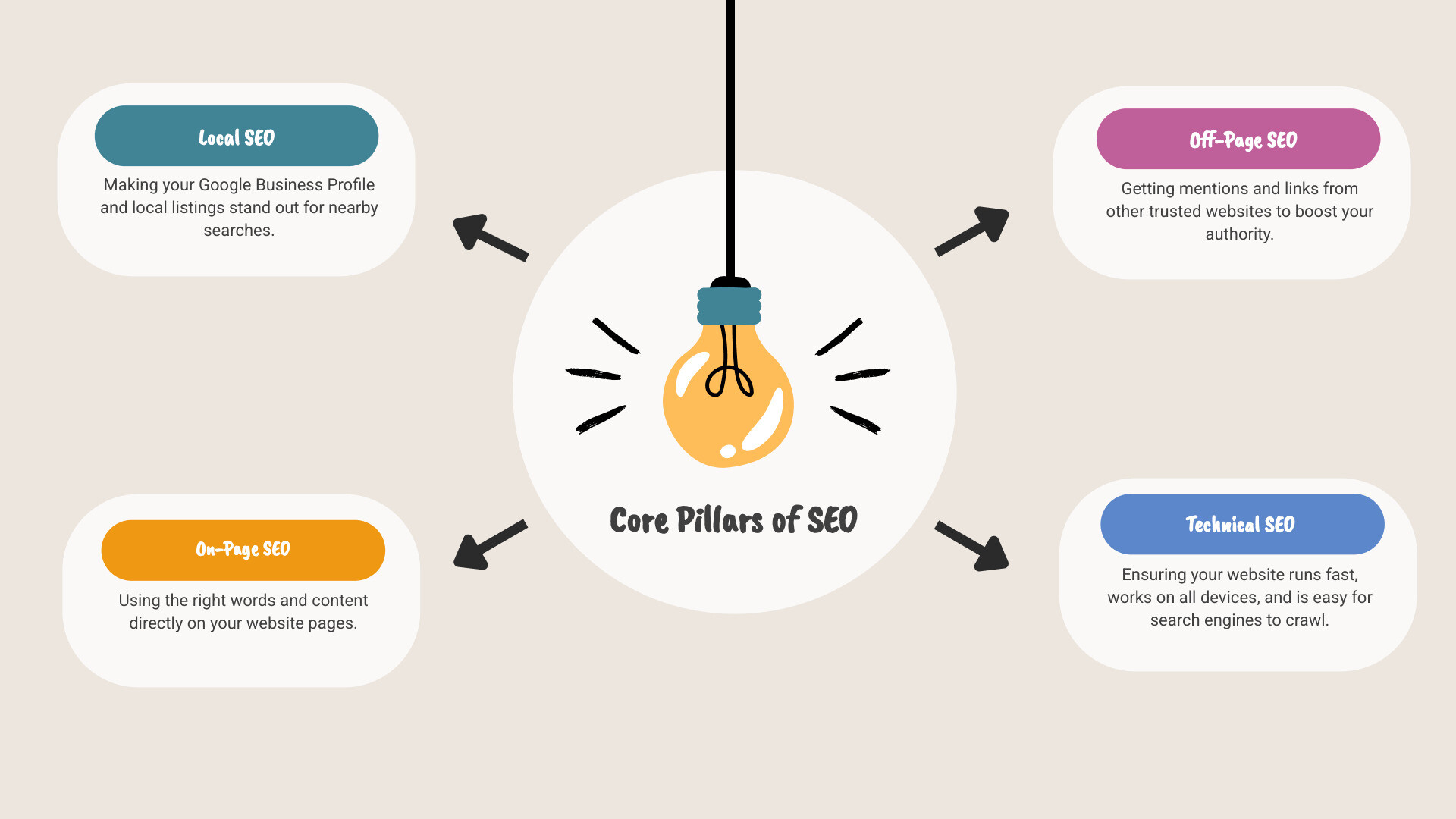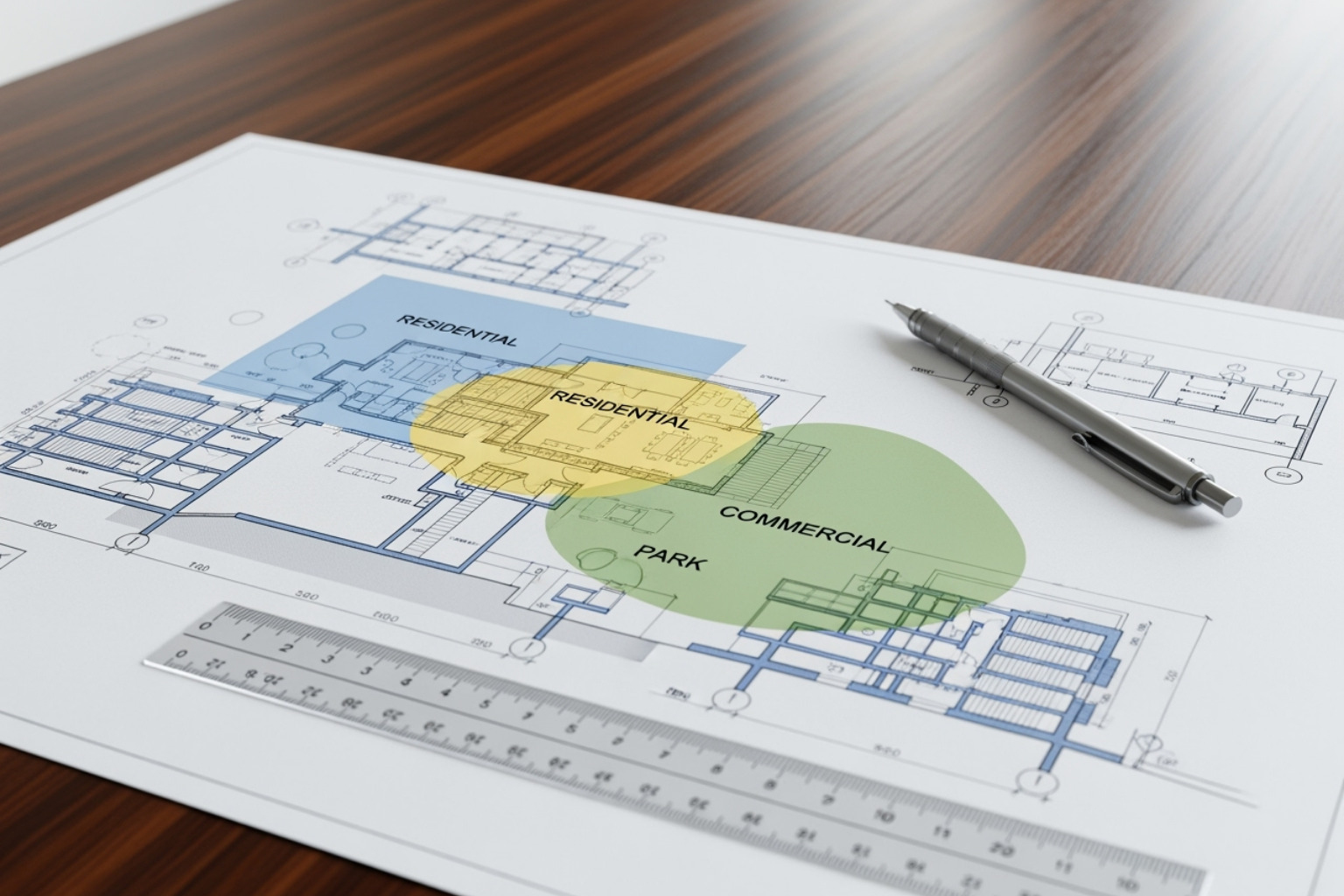SEO for Construction Companies: Boost 2025 Profits
Why SEO is Your Construction Company’s New Foundation
What is SEO for construction companies? It’s the process of optimizing your website so search engines like Google can easily find and show it to potential customers. Think of it as your digital blueprint for online visibility. This involves a combination of Local, On-Page, Off-Page, and Technical SEO to ensure your site is fast, authoritative, and relevant.
While many construction companies still rely on traditional methods, today’s projects begin online. Potential clients search for contractors and builders on the internet, making a strong digital presence essential.
SEO for construction companies helps you appear when people search for your services, delivering “warmer prospects” who are actively seeking solutions. These leads are incredibly valuable, closing at an average rate of 14.6% compared to just 1.7% for cold calls. With organic search driving over half of all website traffic, being found online is the key to growth.

Laying the Digital Foundation: A Guide to SEO for Construction Companies
While word-of-mouth is still golden, the digital landscape has changed how clients find construction companies. With 96% of people looking online for local businesses, your online presence is as vital as your concrete mix. For construction companies, local search is crucial. Appearing in the Google Map Pack for searches like “builder in [your city]” puts you directly in front of eager clients.

To rank in local results, you need solid keyword research. Keywords are the terms your customers use in search engines, from broad queries like “general contracting” to specific long-tail keywords like “new home construction in North Canton, OH.” Understanding these terms and the search intent behind them is the bedrock of your SEO for construction companies strategy.
Optimizing for Local SEO for Construction Companies
With 46% of all Google searches having local intent, local SEO is your cornerstone. Your Google Business Profile (GBP) is your most powerful tool.
Key steps for optimizing your GBP:
- Claim and Complete Your Profile: Fill out every field accurately, from your business category to services and hours. You can setting up your business profile.
- NAP Consistency: Ensure your Name, Address, and Phone number (NAP) are identical across your website, social media, and all online directories.
- Local Citations: List your business in directories like Yelp, Yellow Pages, and construction-specific platforms to signal your legitimacy to Google.
- Customer Reviews: Encourage happy clients to leave reviews, as 95% of customers read them before purchasing. Always respond to feedback to build trust.
- Location-Specific Service Pages: Create dedicated pages for each service in each location (e.g., “Kitchen Remodeling Canton, OH”) to target local searches effectively.
Mastering Keyword Research
Effective keyword research means understanding what, how, and why your audience is searching. This involves knowing different query types:
- B2B vs. B2C Keywords: Target businesses with terms like “commercial construction management” (B2B) or homeowners with “deck builder near me” (B2C).
- Branded vs. Non-Branded Searches: Capture users who know you (“MDM Marketing construction”) and attract new clients with generic terms (“commercial roofing company”).
- Funnel Stages: Address users at every stage, from Awareness (“what is design-build?”) to Consideration (“best general contractors in Ohio”) and Decision (“hire commercial construction company”).
To find these keywords, use tools like the free Google Keyword Planner or Answer the Public for insights into user questions and intent.
Building Your Digital Structure: On-Page SEO and Content Strategy
With your keywords identified, it’s time to build your website’s framework with on-page SEO and a smart content strategy. Content is how you showcase expertise, build trust, and guide clients. Websites with blogs get 67% more leads, proving the power of helpful content like detailed service pages, project portfolios, and articles that build topical authority.

Creating High-Value Content
High-quality content is detailed, helpful material that demonstrates your E-E-A-T (Expertise, Experience, Authority, Trustworthiness).
- Create Detailed Service Pages: Go beyond a simple list. Describe the problems you solve, your process, and what makes you unique.
- Answer Customer Questions: Use your blog to address common concerns, like “How to Choose Roofing Material,” to establish yourself as an expert.
- Showcase Your Work: Use high-resolution photos and videos of your projects to build trust and show off your craftsmanship. Remember to optimize them for speed.
- Update and Interlink: Regularly add new content and link between your blog posts and service pages. This signals relevance to Google and boosts page performance. For more on creating high-quality content, see Google’s guidelines. If you need help building valuable backlinks to your content, you can find more info about our link building services.
Effective On-Page SEO for Construction Companies
How you present your content matters. Key on-page SEO for construction companies elements include:
- Header Tags (H1, H2, H3): Use header tags to structure content, making it readable for users and search engines. Your H1 should contain your primary keyword.
- Title Tags and Meta Descriptions: These snippets appear in search results. Craft compelling title tags and meta descriptions with your main keyword to entice clicks.
- Optimized URL Slugs: Keep your page URLs clean, readable, and keyword-rich. Learn to create optimized URL slugs.
- Image Alt Text: Add descriptive alt text to all images to improve accessibility and help search engines understand the visual content.
- Internal Linking Strategy: Link between relevant pages on your site to help users steer and show search engines how your content is related. The importance of link architecture is significant for SEO.
Reinforcing Your Reputation: Off-Page and Technical SEO
Great on-page content needs support from Off-Page SEO (building your reputation beyond your website) and Technical SEO (ensuring your site’s engine runs smoothly). Together, they solidify your online presence and prove your E-E-A-T (Expertise, Experience, Authority, Trustworthiness) to Google.

With Google’s mobile-first indexing, a fast, mobile-friendly site is non-negotiable. When other respected sites link to you, it tells Google your business is an authority.
Off-Page SEO: Building Authority Beyond Your Website
Off-Page SEO is about earning ‘votes of confidence’ from around the web. The primary strategy is link building. High-quality backlinks from relevant, trusted sources are one of the top Google ranking factors. Quality always trumps quantity.
Effective tactics to earn these links include:
- Guest Blogging: Write helpful articles for reputable industry blogs or local news sites in exchange for a link.
- Local Partnerships: Team up with local architects, real estate agents, or designers for cross-promotion and backlinks.
- Press Releases & Directories: Announce major projects or awards to gain media mentions, and ensure you’re listed in relevant online directories.
- Social Media: While not a direct ranking factor, an active social presence drives traffic and can lead to shares and mentions.
Technical SEO: Ensuring a Solid Framework
Technical SEO is the foundation that ensures search engines can crawl and index your site effectively. If your site is technically flawed, even great content may go unseen.
Key technical elements include:
- Site Speed: Slow websites lose visitors. Aim for a load time under 3 seconds. Use Google’s PageSpeed Insights tool to find areas for improvement.
- Mobile Responsiveness: Your site must work perfectly on all devices, as Google prioritizes the mobile version for ranking with its mobile-first approach.
- Site Architecture: A logical, clear site structure helps users and search engines steer your content.
- XML Sitemaps: Submit a sitemap to Google Search Console to help it find and understand all your important pages.
- Schema Markup: Use schema markup to help search engines understand your content’s context, which can lead to improved search results.
- HTTPS Security: A secure site (with the padlock icon) protects user data and is favored by Google.
Advanced Blueprints: Strategy Nuances and Measuring Success
Not all construction companies are the same, and neither are their SEO for construction companies strategies. The approach for a residential builder differs greatly from a large commercial firm. Understanding these nuances and measuring your efforts are crucial for success. SEO is a marathon; significant results typically take 2-6 months to appear.
Commercial vs. Residential SEO: Key Differences
How you apply SEO principles shifts dramatically depending on whether you target businesses (B2B) or homeowners (B2C). The table below highlights the key strategic differences.
| Feature | Commercial (B2B) SEO Strategy | Residential (B2C) SEO Strategy |
|---|---|---|
| Target Audience | Businesses, developers, property managers, government entities | Individual homeowners, families |
| Content Types | Case studies, whitepapers, technical guides, industry reports | Before-and-after galleries, DIY tips, renovation ideas, blog posts |
| Keyword Intent | Project scale, specialized services, ROI, compliance | Local, aesthetic, cost-focused, problem-solution |
| Sales Cycle Length | Often 6-12+ months, requiring long-term nurturing | Shorter, but still involves significant research and decision |
| Platform Focus | LinkedIn, industry associations, Blue Book, trade publications | Google Business Profile, Yelp, Angi, Houzz, local directories |
Commercial SEO targets decision-makers focused on ROI and compliance, using content like case studies and whitepapers. Residential SEO connects with homeowners’ dreams, using visual galleries and helpful blog posts. This distinction affects everything from keyword choice to platform focus.
Measuring SEO Success and ROI
The goal of SEO for construction companies is to drive business growth. Measuring performance is crucial for understanding what’s working and calculating your return on investment.
Key performance indicators (KPIs) to track include:
- Organic Traffic: How many visitors arrive from search engines?
- Keyword Rankings: Are you climbing in search results for your target keywords?
- Lead Generation: How many form fills and phone calls originate from organic search?
- Conversion Rate: What percentage of those leads become paying clients?
- Backlink Profile: Is your site earning more high-quality links?
Use free tools like Google Analytics and Google Search Console to monitor these metrics. Analytics shows visitor behavior, while Search Console provides insights into your site’s search performance and technical health. Consistently tracking these KPIs turns clicks into contracts!
Frequently Asked Questions about Construction SEO
How long does it take to see results from SEO?
SEO is a long-term strategy, not a quick fix. While minor improvements may appear sooner, substantial results from SEO for construction companies typically take 3 to 6 months. This timeframe allows Google to crawl, index, and assess your site’s quality and authority. As experts note, it can take 2-6 months to show results from organic search. The speed of results depends on factors like market competition, your budget, and whether you’re starting with a new or established website.
What are the biggest benefits of SEO for a construction business?
A strong SEO strategy delivers significant, bottom-line benefits:
- Increased Online Visibility: Ranking on the first page of Google puts you in front of the vast majority of searchers.
- Higher Quality Leads: SEO attracts “warmer prospects” actively searching for your services, leading to a high 14.6% conversion rate.
- Cost-Effective Marketing: Over time, SEO provides a sustainable and affordable return on investment compared to paid ads.
- Improved Credibility and Trust: Top search rankings position your business as a trusted industry leader.
- Competitive Advantage: Investing in SEO helps you capture market share and stand out from competitors.
- 24/7 Lead Generation: Your website works around the clock, capturing inquiries even when your office is closed.
Can I do SEO myself or should I hire an agency?
Deciding whether to handle SEO for construction companies yourself or hire a professional is a key choice.
DIY SEO offers control and cost savings but is incredibly complex, time-consuming, and requires constant learning to keep up with Google’s algorithm changes. Juggling this with running a construction business is a major challenge.
Hiring an agency provides specialized expertise, access to professional tools, and a dedicated team focused on delivering faster results. An agency like MDM Marketing combines technical SEO with compelling content to create a custom strategy for your growth.
Given the complexity, it’s no surprise that 66% of construction companies outsource their SEO. This allows you to focus on your core business while experts build your digital foundation.
Conclusion
Building a successful construction business today requires a robust online presence, and SEO for construction companies is the essential blueprint. From optimizing for local search and creating high-value content to building backlinks and ensuring your site is technically sound, every element contributes to a stronger digital foundation.
SEO is not a marketing expense; it’s a strategic investment in sustainable growth. By implementing these strategies, your construction business can attract “warmer” prospects who are actively searching for your services. This leads to more projects, a healthier pipeline, and a powerful online reputation. Just as a physical structure needs a solid foundation, your company’s digital footprint needs a robust SEO strategy.
Ready to lay the groundwork for your digital success and turn online visibility into tangible growth? We’re here to help. Contact us to build your SEO blueprint and let’s get started!
About The SEO Experts at MDM Marketing
This author hasn't written a bio yet.
